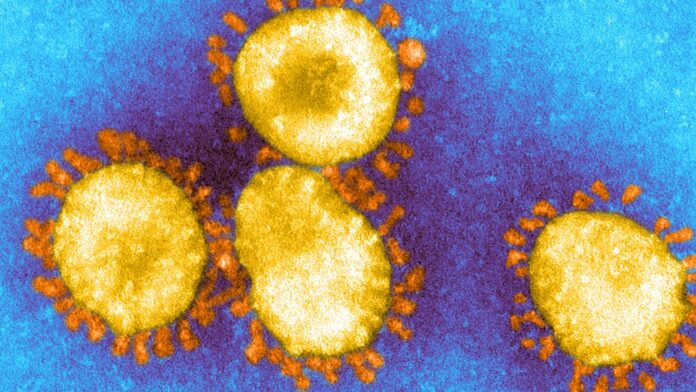Web Desk
SARS-CoV-2, the virus that causes COVID-19, has had a major impact on human health globally; infecting a large number of people; causing severe disease and associated long-term health sequelae; resulting in death and excess mortality, especially among older and vulnerable populations; interrupting routine healthcare services; disruptions to travel, trade, education and many other societal functions; and more broadly having a negative impact on peoples physical and mental health.
Since the start of the COVID-19 pandemic, WHO has received several reports of unusual public health events possibly due to variants of SARS-CoV-2. WHO routinely assesses if variants of SARS-CoV-2 result in changes in transmissibility, clinical presentation and severity, or if they impact on countermeasures, including diagnostics, therapeutics and vaccines. Previous reports of the D614G mutation and the recent reports of virus variants from the Kingdom of Denmark, the United Kingdom of Great Britain and Northern Ireland, and the Republic of South Africa have raised interest and concern in the impact of viral changes.
A variant of SARS-CoV-2 with a D614G substitution in the gene encoding the spike protein emerged in late January or early February 2020. Over a period of several months, the D614G mutation replaced the initial SARS-CoV-2 strain identified in China and by June 2020 became the dominant form of the virus circulating globally. Studies in human respiratory cells and in animal models demonstrated that compared to the initial virus strain, the strain with the D614G substitution has increased infectivity and transmission. The SARS-CoV-2 virus with the D614G substitution does not cause more severe illness or alter the effectiveness of existing laboratory diagnostics, therapeutics, vaccines, or public health preventive measures, according to a WHO report.
In August and September 2020, a SARS-CoV-2 variant linked to infection among farmed mink and subsequently transmitted to humans, was identified in North Jutland, Denmark. The variant, referred to as the “Cluster 5” variant by Danish authorities, has a combination of mutations not previously observed. Due preliminary studies conducted in Denmark, there is concern that this variant has may result in reduced virus neutralization in humans, which could potentially decrease the extend and duration of immune protection following natural infection or vaccination. Studies are ongoing to assess virus neutralization among humans with this variant. To date, following extensive investigation and surveillance, Danish authorities have identified only 12 human cases of the Cluster 5 variant in September 2020, and it does not appear to have spread widely.
On 14 December 2020, authorities of the United Kingdom reported to WHO a variant referred to by the United Kingdom as SARS-CoV-2 VOC 202012/01 (Variant of Concern, year 2020, month 12, variant 01). This variant contains 23 nucleotide substitutions and is not phylogenetically related to the SARS-CoV-2 virus circulating in the United Kingdom at the time the variant was detected. How and where SARS-CoV-2 VOC 202012/01 originated is unclear. SARS-CoV-2 VOC 202012/01 initially appeared in South East England but within a few weeks began to replace other virus lineages in this geographic area and London. As of 26 December 2020, SARS-CoV-2 VOC 202012/01 has been identified from routine sampling and genomic testing conducted across the United Kingdom . Preliminary epidemiologic, modelling, phylogenetic and clinical findings suggest that SARS-CoV-2 VOC 202012/01 has increased transmissibility. However, preliminary analyses also indicate that there is no change in disease severity (as measured by length of hospitalization and 28-day case fatality), or occurrence of reinfection between variant cases compared to other SARS-CoV-2 viruses circulating in the United Kingdom.1 Another of the mutations in the VOC 202012/01 variant, the deletion at position 69/70del was found to affect the performance of some diagnostic PCR assays with an S gene target. Most PCR assays in use worldwide will use multiple targets and therefore the impact of the variant on diagnostics is not anticipated to be significant. Laboratory evaluation has demonstrated no significant impact on the performance of antigen-based lateral flow devices. As of 30 December, VOC-202012/01 variant has been reported in 31 other countries/territories/areas in five of the six WHO regions.
On 18 December, national authorities in South Africa announced the detection of a new variant of SARS-CoV-2 that is rapidly spreading in three provinces of South Africa. South Africa has named this variant 501Y.V2, because of a N501Y mutation. While SARS-CoV-2 VOC 202012/01 from the UK also has the N501Y mutation, phylogenetic analysis has shown that 501Y.V2 from South Africa are different virus variants. In the week beginning 16 November, routine sequencing by South African health authorities found that this new SARS-CoV-2 variant has largely replaced other SARS-CoV-2 viruses circulating in the Eastern Cape, Western Cape, and KwaZulu-Natal provinces. While genomic data highlighted that the 501.V2 variant rapidly displaced other lineages circulating in South Africa, and preliminary studies suggest the variant is associated with a higher viral load, which may suggest potential for increased transmissibility, this, as well as other factors that influence transmissibility, are subject of further investigation. Moreover, at this stage, there is no clear evidence of the new variant being associated with more severe disease or worse outcomes. Further investigations are needed to understand the impact on transmission, clinical severity of infection, laboratory diagnostics, therapeutics, vaccines, or public health preventive measures. As of 30 December, the 501Y.V2 variant from South Africa has been reported from four other countries to date.
The authorities in the affected countries are conducting epidemiological and virological investigations to further assess the transmissibility, severity, risk of reinfection and antibody response to new variants. As one of the mutations (N501Y) – found in both the SARS-CoV-2 VOC 202012/01 and 501Y.V2 variants – is in the receptor binding domain, the authorities are investigating the neutralization activity of sera from recovered and vaccinated patients against these variants to determine if there is any impact on vaccine performance. These studies are ongoing.
Genomic data of the SARS-CoV-2 VOC 202012/01 and 501Y.V2 variants has been shared by the national authorities and uploaded to the Global Initiative on Sharing Avian Influenza Data (GISAID) and genomic surveillance of the virus continues, globally.















